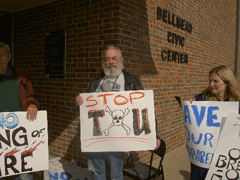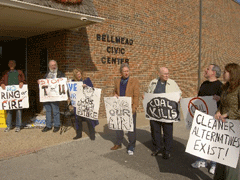Texas Turnaround
Air Date: Week of March 2, 2007

TXU is dropping plans to build eight more plants like this one, its Monticello Steam Electric Station, named after nearby Lake Monticello, Texas. (Courtesy of TXU Corp.)
Texas power giant TXU was on a fast track to build eleven new coal-fired plants. Now an investment group is poised to take over the utility and, after negotiating with environmental groups, is canceling all but three of the coal plants. Living on Earth's Jeff Young looks at how the deal went down.
Transcript
CURWOOD: From the Jennifer and Ted Stanley Studios in Somerville, Massachusetts - this is Living on Earth. I’m Steve Curwood. As investment firms hoping to take over a Texas power company were refining their bid last month, they asked for help from an unusual source: environmental groups. Outfits like Environmental Defense and others had been fighting the power company, TXU, over its plans to build nearly a dozen new coal-fired power plants. The private equity firms Texas Pacific and KKR wanted to know what it would take to get green groups to support the takeover bid. The result of the talks is a 32-billion-dollar proposed cash buyout of TXU that could bring a dramatic reduction in the growth of the firm’s greenhouse gas emissions.
The deal isn’t yet final. Still, as Living on Earth’s Jeff Young reports, when environmental groups are at the table for what could become the biggest corporate buyout in U.S. history, you know something very different is going on.
YOUNG: TXU executives were so sure their new power plants would be built they’d already signed contracts for boilers to burn the coal. And why not? After all, the Texas governor himself had put permits for TXU’s 11 coal-fired facilities on a fast track to approval. But that fast track quickly derailed. Now, private equity firms are gobbling up TXU, teaming up with environmentalists and knocking down plans for all but three of those coal-fired plants.

TXU is dropping plans to build eight more plants like this one, its Monticello Steam Electric Station, named after nearby Lake Monticello, Texas. (Courtesy of TXU Corp.)
HADDEN: We’re very concerned that what’s happening here in Texas could undo the gains made elsewhere in the country. We don’t want that to happen and we’re fighting hard.
YOUNG: Soon it wasn’t just environmentalists speaking up. The mayors of Dallas and Houston, the Waco Chamber of Commerce, ranchers and republican lawmakers all had concerns about coal power. Republican state representative Charles "Doc" Anderson wrote a bill to slow down TXU’s permits.
ANDERSON: Haste makes waste. Let’s do it right, let’s not rush things. Let’s look out for the health of our people and ah, and ah, Texas can lead the nation.
YOUNG: By January Anderson’s proposed moratorium on coal was gaining strength, despite a small army of TXU lobbyists in the statehouse. Then two leaders in the U.S. Senate weighed in. Democrats Jeff Bingaman and Barbara Boxer chair the Senate energy and environment committees, respectively and both want a law to cut the country’s greenhouse gas emissions. They wrote an opinion piece in a Dallas newspaper putting TXU’s potential investors on notice.
BINGAMAN: It made a point that needed to be made about TXU not being able to assume that future coal fired plants would be grandfathered in if we’re able to adopt a cap and trade system. I think that’s a point that needed to be made so we were glad to make it.

Did these TXU protesters pave the way for the biggest buyout in history? (Photo: Jeff Young)
HAWKINS: This is really about the role of big business in helping to solve the global warming problem.
YOUNG: That’s David Hawkins of the Natural Resources Defense Council. The money managers planning to take over TXU asked NRDC and the group Environmental Defense to join a secret week of negotiations to give the deal a green stamp of approval. The result is a pledge to turn a company that would have been one of the country’s biggest sources of greenhouse gases into one that will dramatically cut emissions. The new TXU would meet much of its energy demand through efficiency and wind energy. It would tie executive pay to environmental performance. And it will join a business team lobbying Congress for a law to control global warming pollution. That deal still has to win approval from Texas lawmakers worried about ratepayer costs. And other investors might yet make rival bids. But if finalized, the buyout would bring a remarkable turnaround, made more noteworthy by the players involved.
REICHER: I think it’s quite a powerful signal being sent by kind of the core of the investment industry.

Fired up over coal-fired power. These demonstrators spoke out at a hearing near Waco, Texas. (Photo: Jeff Young)
REICHER: This is the core of Wall Street sitting down and saying we are not gonna place as big a bet as we thought we were on old fashioned coal-fired power plants.
YOUNG: Even some coal-rich states are getting the message. Montana’s Democratic Governor Brian Schweitzer says it’s time for coal companies to start dealing with their greenhouse gases if they want Wall Street to deal with them.
SCHWEITZER: There’s going to have to be some companies that take the lead so that these, ah, new zero emission coal plants will get built and electricity will be delivered to the markets.
YOUNG: Many in the climate science community see the TXU buyout as a positive move. Woods Hole Research Center Director and Harvard Professor John Holdren just helped write a United Nations report called "Confronting Climate Change.”
HOLDREN: We say that the world should no longer build any coal burning power plants that are not amenable to retrofit to capture and sequester their carbon dioxide. None, no more.
YOUNG: Around the country there are still some 150 coal power proposals on the drawing board. Environmental groups, emboldened by the success of the TXU takeover, aim to stop them. So the companies in the coal business can expect to feel some heat.
For Living on Earth I’m Jeff Young in Washington.
Links
TXU comment on the environmental agreement included in the proposed TXU buyout:
the Natural Resources Defense Council
Environmental Defense comment on the environmental agreement included in the proposed TXU buyout:
Living on Earth wants to hear from you!
Living on Earth
62 Calef Highway, Suite 212
Lee, NH 03861
Telephone: 617-287-4121
E-mail: comments@loe.org
Newsletter [Click here]
Donate to Living on Earth!
Living on Earth is an independent media program and relies entirely on contributions from listeners and institutions supporting public service. Please donate now to preserve an independent environmental voice.
NewsletterLiving on Earth offers a weekly delivery of the show's rundown to your mailbox. Sign up for our newsletter today!
 Sailors For The Sea: Be the change you want to sea.
Sailors For The Sea: Be the change you want to sea.
 The Grantham Foundation for the Protection of the Environment: Committed to protecting and improving the health of the global environment.
The Grantham Foundation for the Protection of the Environment: Committed to protecting and improving the health of the global environment.
 Contribute to Living on Earth and receive, as our gift to you, an archival print of one of Mark Seth Lender's extraordinary wildlife photographs. Follow the link to see Mark's current collection of photographs.
Contribute to Living on Earth and receive, as our gift to you, an archival print of one of Mark Seth Lender's extraordinary wildlife photographs. Follow the link to see Mark's current collection of photographs.
 Buy a signed copy of Mark Seth Lender's book Smeagull the Seagull & support Living on Earth
Buy a signed copy of Mark Seth Lender's book Smeagull the Seagull & support Living on Earth

